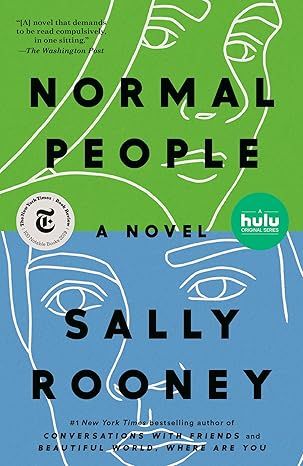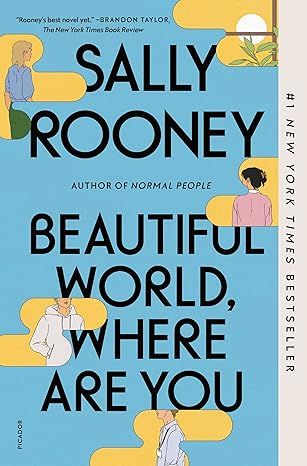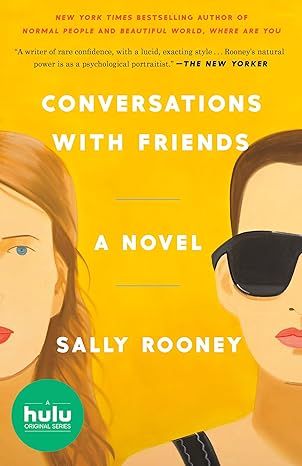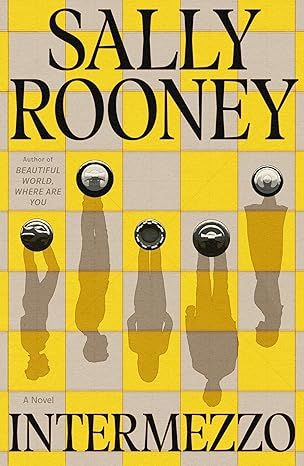Normal People: A Novel
4.1 out of 5
123,460 global ratings
NOW AN EMMY-NOMINATED HULU ORIGINAL SERIES • NEW YORK TIMES BESTSELLER • LONGLISTED FOR THE BOOKER PRIZE • “A stunning novel about the transformative power of relationships” ( People ) from the author of Conversations with Friends, “a master of the literary page-turner” (J. Courtney Sullivan).
“[A] novel that demands to be read compulsively, in one sitting.”— The Washington Post
ONE OF ENTERTAINMENT WEEKLY ’S TEN BEST NOVELS OF THE DECADE
TEN BEST BOOKS OF THE YEAR: People, Slate, The New York Public Library, Harvard Crimson
Connell and Marianne grew up in the same small town, but the similarities end there. At school, Connell is popular and well liked, while Marianne is a loner. But when the two strike up a conversation—awkward but electrifying—something life changing begins.
A year later, they’re both studying at Trinity College in Dublin. Marianne has found her feet in a new social world while Connell hangs at the sidelines, shy and uncertain. Throughout their years at university, Marianne and Connell circle one another, straying toward other people and possibilities but always magnetically, irresistibly drawn back together. And as she veers into self-destruction and he begins to search for meaning elsewhere, each must confront how far they are willing to go to save the other.
Normal People is the story of mutual fascination, friendship, and love. It takes us from that first conversation to the years beyond, in the company of two people who try to stay apart but find that they can’t.
WINNER: The British Book Award, The Costa Book Award, The An Post Irish Novel of the Year, Sunday Times Young Writer of the Year Award
BEST BOOKS OF THE YEAR: The New York Times , The New York Times Book Review, Oprah Daily, Time, NPR, The Washington Post, Vogue, Esquire, Glamour, Elle, Marie Claire, Vox, The Paris Review, Good Housekeeping, Town & Country
304 pages,
Kindle
Audiobook
Hardcover
Paperback
Audio CD
First published February 17, 2020
ISBN 9781984822185
About the authors
Sally Rooney
SALLY ROONEY was born in the west of Ireland in 1991. Her work has appeared in The New Yorker, The New York Times, Granta and The London Review of Books. Winner of the Sunday Times Young Writer of the Year Award in 2017, she is the author of Conversations with Friends and the editor of the Irish literary journal The Stinging Fly.
Reviews
Penny
5
A masterfully-written novel about young love in the 21st Century
Reviewed in the United States on October 1, 2018
Verified Purchase
Do you ever consider the profound impact significant others have on your life? Decades ago, when our son was toddlerish, my husband and I took him into the country for a weekend. We rented a tiny, Eskom-free stone cottage in a dark valley. One night, with the boy asleep, we sat outside, dazzled by the night sky, and drank a bottle of wine. We’d been a couple for more than a decade by then and somehow began talking about how being together had shaped us as individuals and influenced our life decisions. It was a gentle, but remarkably illuminating discussion for both of us and about both of us. It's a conversation I regularly replay to myself to remember how lucky I am.
I thought a great deal about that night as I read Sally Rooney’s novel, Normal People last week. Normal People tells the story about Marianne and Connell’s relationship, which begins when they’re at school in a small town in West Ireland and continues – on and off – for another four years while they’re at college in Dublin. It’s a tale with so many layers that, while my experience of reading it bordered on compulsive, I find it difficult to analyse – suffice to say that it’s not about the plot; it’s about the characters and their inner lives, and the writing.
Rooney, who is 27-years-old, is widely feted as the next best thing, “one of the most exciting voices to emerge in an already crackerjack new generation of Irish writers”, and a “Salinger for the Snapchat generation”. I don’t dispute the praise. Her writing is extraordinarily elegant. Confident and uncluttered, it conveys an immediacy and ingenuousness that drew me in and held me from beginning to end, which came too soon. The story, I felt – shocked to discover I'd reached the final full stop – was unfinished, there were loose ends to tuck away. But, once I recovered, I realised the way it ends is part of its magic. Real relationships are forever evolving, eternally incomplete, and so it figures that a novel about relationships will be too.
Normal People is told from both Marianne’s and Connell’s points of view. It reminded me how, no matter how well you think you know a person, your perceptions and understanding of what they say and mean can be skewed. The novel also shows how our identity, self-esteem and who we become as adults are bound to our upbringing – indefinitely. Marianne is from a wealthy, but unloving and dysfunctional family. Connell is from a poor, but loving family. It largely shapes who they are and how they relate to the world. The novel also examines the impact of bullying – both on victims and perpetrators.
Ironically, I might not find the book easy to analyse, but I could go on forever, waffling about the many layers in Normal People. I daren’t though because then you might not feel compelled to read the book yourself, which would be a pity. A huge pity. Here’s a tiny sample of the writing to demonstrate what a humungous pity it would be:
“Helen has given Connell a new way to live. It’s as if an impossibly heavy lid has been lifted off his emotional life and suddenly he can breathe fresh air. It is physically possible to type and send a message reading: I love you! It had never seemed possible before, not remotely, but in fact it’s easy. Of course if someone saw the messages he would be embarrassed, but he knows now that this is a normal kind of embarrassment, an almost protective impulse towards a particularly good part of life. He can sit down to dinner with Helen’s parents, he can accompany her to her friends’ parties, he can tolerate the smiling and the exchange of repetitive conversation. He can squeeze her hand while people ask him questions about his future. When she touches him spontaneously, applying a little pressure to his arm, or even reaching to brush a piece of lint off his collar, he feels a rush of pride, and hopes that people are watching them. To be known as her boyfriend plants him firmly in the social world, establishes him as an acceptable person, someone with a particular status, someone whose conversational silences are thoughtful rather than socially awkward."
I’m not sure I feel changed after reading Normal People, but I do feel upgraded. And reminded about how life is a series of relationships, and how a few of them help shape who we are and how we live our lives. And that thinking about that and acknowledging those who positively influence us is important. And yes, Sally Rooney has a fan in me. My current read is her first novel, Conversations with Friends.
Read more
631 people found this helpful
ela
5
Good quality, great price
Reviewed in the United States on October 2, 2024
Verified Purchase
Arrived on time and I decided to get it second-handed, such a great choice, the quality was amazing and I was able to get it for a much nicer price
avis.reads
5
refreshing portrayal of a relationship that is not black and white;
Reviewed in the United States on January 30, 2024
Verified Purchase
5/5 ☆☆☆☆☆ #andreeareviews
I have finally read Normal People! I watched the show last year and loved the refreshing portrayal of a relationship that is not black and white; it’s complex, both joyful and painful, and follows the growth of the protagonists.
Needless to say, I loved the book. I’ve been putting it off because this is the last Rooney novel that I haven’t read, and I am left with a massive book hungover that only another Rooney novel can fix. It’s impossible not to feel with the characters, from the awkwardness of the relationship to the impact of their personal trauma on it. It feels like Rooney reaches into your soul, turns it inside out and says: “Here, deal with this now.”. The writing is deceptively simple yet cuts straight to the heart.
We met Marianne and Connell in high school. On the surface, Marianne is an ostracised, weird girl with no friends and an aloof attitude that puts people off. Connell is a popular guy, having lots of friends and being the object of interest of many girls. Connell’s mother works for Marianne’s household as a housekeeper; thus, Connell meets Marianne outside of school whenever he picks up his mom. Their brief interactions give birth first to a form of hidden friendship that turns into lust and then love as they get closer and more intimate.
Their relationship is complicated in the true sense of the word and is deeply influenced by their trauma. Marianne was physically abused by her father; upon his death, the abuse continued with both her mother and brother physically and emotionally abusing her; she was ignored at home and at school, growing up without any friends and without being loved; in school, she was bullied and ostracised, becoming an apparently cold person, incapable of healthy attachment or love. She does not think she deserves to be loved, and I don’t think she knows what being loved really means.
On the other hand, Connell has grown up with a single mother, never knowing her father. He felt loved and appreciated at home; however, he is an introverted, quiet person; nevertheless, this doesn’t stop him from making friends in school and being easygoing and attractive. Later on, however, in college (they both go to the same college), connecting with people becomes harder, and he feels burdened by his social background, coming from a working-class family and hanging out in a circle of rich individuals (such as Marianne). Their relationship evolves and devolves like a mesmerising dance from youth to young adulthood. They bring complexities into each other’s lives, driven by personal trauma, comfort, and a sense of having found home in that person who knows you and understands you fully. Connell, the quiet, brooding intellect, and Marianne, the sharp, unapologetic force of nature - their dynamic is a study of contrasts.
Connell’s internal struggles, the perpetual feeling of not being “enough”, and Marianne’s journey from isolation to self-discovery and perhaps self-love (I am not certain she reached it by the end of the book, but it does feel like she’s on her way) - Rooney peels back the layers, revealing characters so achingly human. And this is what makes Rooney’s writing stand out for me: the incredibly relatable characters, with awkward moments, misunderstandings, and hardship, to communicate feelings and thoughts. The plot becomes, therefore, a canvas where their insecurities, desires, and mistakes point to a poignant picture of love, friendship, and the quest for identity.
I said it before: Rooney is a master of dissecting the nuances of human connection. The themes of power, vulnerability, and societal expectations are woven into the narrative's fabric. The on-again-off-again nature of Marianne and Connell’s relationship isn’t just about love; it’s a mirror reflecting the intricacies of self-worth, societal pressures, and the messiness of growing up.
The exploration of intimacy, both emotional and physical, is raw and unapologetic. Rooney does not shy away from the uncomfortable, and that’s where the magic happens. The power dynamics at play, the impact of societal expectations on individual choices - it’s a literary feast for readers hungry for substance.
Finally, Normal People is not just a book for me; it’s a mirror reflecting the jagged edges of human relationships. Rooney doesn’t hand you answers on a silver platter; she hands you a mirror and says: “Look closely.”. In the end, you’re left with a breathtaking yet heartbreaking portrait of love and the messy, unfiltered journey toward self-acceptance, pondering long after the final page.
Read more
31 people found this helpful
MommaLayne
5
Complexities of Love and Friendship
Reviewed in the United States on September 26, 2024
Verified Purchase
"Normal People" by Sally Rooney is a beautifully crafted exploration of the complexities of love, friendship, and the ways in which individuals navigate their emotional landscapes. The story follows Connell and Marianne, two teenagers from a small town in Ireland who come from starkly different social backgrounds—Connell is the popular athlete, while Marianne is the outsider. Their initial, awkward conversation marks the start of a profound connection that will shape their lives in unexpected ways.
As the narrative unfolds, we see their relationship evolve during their time at Trinity College in Dublin, where Marianne flourishes socially and Connell struggles with his insecurities. Despite forging paths apart and exploring other relationships, the magnetic pull between them draws them back together, highlighting the complexity of their bond. Rooney skillfully examines themes of intimacy, class disparity, and individual growth, painting an intimate portrait of a love that is both tender and tumultuous. "Normal People" not only captures the essence of young love but also reflects the struggles of finding authenticity amidst societal expectations, delivering a narrative that resonates deeply with readers long after they turn the final page.
Read more
Denise Provencher
4
Exceptional young writer
Reviewed in the United States on July 19, 2024
Verified Purchase
This was the first book I had read by Sally Rooney. She is an exceptional writer, creating believable and complex characters and relationships. I would have given this book five stars but felt that the story stalled at points. Nonetheless, the writing is superb and I look forward to reading more by this author.
Yale
4
Good read
Reviewed in the United States on October 6, 2024
Verified Purchase
It took me a little bit longer than expected to finish this one, the story was a little bit confusing, but overall it was nice and interesting
bookworm
3
I wanted to like this more, but ...
Reviewed in the United States on September 11, 2019
Verified Purchase
Rooney is an interesting writer and a talented one. She embraces a variety of stylistic eccentricities that weren't off-putting per se (including dispensing with quotes for dialog), but in retrospect, seem somewhat contrived, perhaps to mark her as "different" among her literary peers. Her prose capturez moods and emotions compellingly, and despite the novel's shortcomings, I found it very readable and engaging to a degree. So I really did want to give this a strong write-up, but by the end, I was mostly exhausted and irritated by the two main characters and their myriad and inconsistent neuroses.
Here's Connell at the start: the much loved son of a working-class single mom, smart, athletic and popular (the high school trifecta, even in Ireland I'd guess) and seemingly completely indifferent to knowing anything about his biological dad, including who he is. It's mentioned once and then never again. How odd is that? Does it explain his unwillingness to be seen with Marianne even though he otherwise comes across as confident and cool, and unafraid to go against the grain. Does it explain his total breakdown and flirtation with suicidal thoughts later -- a shift I found shocking without any real run-up other than the suicide of what seemed a casual high school friend. Then a few months later, he's back on track, again inexplicably.
Then there's Marianne whose shifts seem even more radically unbelievable: She's invisible at school or disliked (it's not totally clear which) and yet appears totally indifferent to the scorn or unfriendliness of her peers while also yearning for some human connection. She's above or outside the social fray and believes herself a superior being on one level, yet consumed by self-hatred on another level. We learn she's a victim of abuse (father, brother physically, maybe sexually?) and mother (verbally and emotionally). So she's a mess -- yet once at Trinity, suddenly popular, beautiful, admired. How does that happen? Why did it happen? Then within months, maybe a year, loses friends, is talked about scornfully and negatively, dips in a sado-masochistic relationship in Sweden and yearns to be submissive, but never with anyone who professes to love her (although Connell seems outside that equation). Again, what? Why? Marianne in particular wants to know she's special -- NOT normal -- while Connell seems to embrace a sense of normality as an occasional blessing (granted to him by a girlfriend, for instance) but normalcy is never part of what connects him and Marianne in a relationship that is both affecting and deeply dispiriting. It's clear they do love each other, but even at the end (and I hated the end) it's not clear what keeps them apart. Is their love unreal? Unsustainable? Abnormal in some way? Is she being noble and unselfish to send him off to study in the US? Is the last line a suggestion they will ultimately have a relationship that looks more "normal" (to play off Rooney's always ironic use of the word). Or is she simply giving up on herself in some weird and mad form of submission. Ultimately, it's impossible to know and sadly, by that point, I didn't care.
Read more
20 people found this helpful
Sarah
2
Good writing, not a particularly great book.
Reviewed in the United States on June 24, 2019
Verified Purchase
IM GOING TO SPOIL THIS BOOK FOR YOU
- I really would argue against reading this book if you are sensitive to descriptions of dissociation (particularly as a coping mechanism for abuse, and also-in another character-as a symptom of depression. Points to the author for having a spot-on description of depression though) also there's s&m used kindof as a coping mechanism for the psychological effects of abuse if that's not your thing
- Now that the warnings are out of the way I just want to say I love the characters. I genuinely like them and want them to do well, and if you like books with unsatisfying/ambiguous endings then this probably won't bother you too much. The issue I encounter is that the problems and traumas these characters goes through are too real for me, and because of that I want them to get past them in a healthy way. I want them to end up happy and healthy because so much of their lives has not been that (especially marianne, poor thing). This book doesn't really do that. In Marianne I recognize a young woman trying to carve out a life for herself in spite of a lifetime of emotional, psychological and physical abuse. It can be hard to recognize the specific patterns and behaviors that abuse causes us to adopt to survive when you've been doing them for as long as you can remember, and because of that I'm really sympathetic to Marianne and I understand her struggle and maybe even why she does some of the things that she does, but there isn't really a resolution for that. She doesn't seek help like connell does (and no having a man doesn't count as seeking help). In reviews and such they say that these two dance around each other, but at the end it seems like one is trying to get help, learning and growing to become a healthier person while the other is sinking deeper into their own unhealthy coping skills and trauma, and at the end they just sort of drift into a vaguely together, still-unhealthy-but-at-least-hes-not-hitting-her relationship (that ends??? I think??? Dude I don't even know). This feels very Twilight to me, specifically in the "this relationship is severely unhealthy but I can't be with anyone else and we're not going to try to figure out why we're so unhealthy, we're gonna romanticize it" way. And (actual legit spoiler) the two main characters break up (???? Sort of??? It's not specified????) In the same way that Connell and his other girlfriend do-one girl is jealous of another girl.
- I know this is a long review but I feel some things k. Now to the last point. I've heard some reviews and such claiming that this is a big feminist book (which is a weird title to give a book that's not about feminism) in I would argue that it's a good book, but not necessarily a feminist one. If by "feminist book" one just means "a book with well-written female characters who are complex and different and who have sex and it's normal and they as characters have feminist views" then sure, go ahead. But my problem with that title is that Marianne finds peace (sort of) through a man, and that's the end to her story. She describes herself as feeling empty, like a void that has to be filled (and while she herself doesn't seem to realize it I think this may be a cause of being abused for as long as she was alive and having severe depression because of it) but she literally says "she was in his power, he had chosen to redeem her, she was redeemed" and like, that's the end. The goal here. Have you ever been getting towards the end of a book and it feels like nothing's resolved, and you look ahead to see how many pages are left to resolve the thing? Well, I read that sentence with only three pages left and it did not get resolved. For a relationship that seemed initially to be about how being around each other was so freeing, it ends in control: in power, and who gives it. It's the power to give someone value. While most of Marianne's relationships have been with people who degraded her and gave her no value, it ends with a relationship with someone who gives her value and praise and she gives him power over her because of that. But the problem I have with that is that at the end, her value still comes from someone else. The author doesn't let Marianne learn that her value is inherent, independent of a man, she just says 'you felt you didn't have value because everyone said so, but now you do because this man says so' and that's a concerning dynamic.
Look, the truth is that as far as writing and characterization is concerned, this is a good book. I wouldn't say it's an enthralling book because I generally finish enthralling books within the day or at most a week, and this one I could pick up and put down without really caring too much if I actually finished it other than knowing that I wanted to finish the book for the sake of finishing the book, but I like the characters and I root for them and the dialogue and interactions and plot of the characters is interesting. Also, whether you take this as a good point or a bad point (and I personally see it as a little bit of both) I was actually quite angry at the end of the book because of how it turned out and while that can definitely be interpreted as a bad thing (because it's a FRUSTRATING ending) it did at least make me feel something so there's that ... ?
Read more
84 people found this helpful
NostalgiaLover
2
Hard to like a book that doesn’t have characters with any redeemable qualities
Reviewed in the United States on October 8, 2024
Verified Purchase
This is coming of age book about a boy and a girl in Ireland from their high school and college years. They are both from dysfunction families, one wealthy and one poor. Both characters don’t like themselves and have no real redeemable qualities and as they go through on again off again relationships from high school through college, neither character changes much nor does there situations. I kept routing for them to stay together and to overcome their emotional problems but the story didn’t end much differently than it started. If you enjoy reading about such characters without much growth or hope, than maybe you’ll enjoy this. For me, it dragged on, was repetitive and did not have one character to feel good about.
Read more
Top Sally Rooney titles
Best Sellers

The Tuscan Child
4.2
-
100,022
$8.39

The Thursday Murder Club: A Novel (A Thursday Murder Club Mystery)
4.3
-
155,575
$6.33

Sapiens: A Brief History of Humankind
4.6
-
140,302
$13.49

The Butterfly Garden (The Collector, 1)
4.3
-
88,556
$9.59

Things We Hide from the Light (Knockemout Series, 2)
4.4
-
94,890
$11.66

The Last Thing He Told Me: A Novel
4.3
-
154,085
$2.99

The Perfect Marriage: A Completely Gripping Psychological Suspense
4.3
-
143,196
$9.47

The Coworker
4.1
-
80,003
$13.48

First Lie Wins: A Novel (Random House Large Print)
4.3
-
54,062
$14.99

Mile High (Windy City Series Book 1)
4.4
-
59,745
$16.19

Layla
4.2
-
107,613
$8.99

The Locked Door
4.4
-
94,673
$8.53




